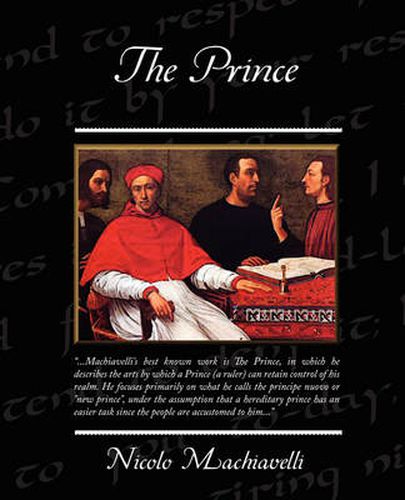Readings Newsletter
Become a Readings Member to make your shopping experience even easier.
Sign in or sign up for free!
You’re not far away from qualifying for FREE standard shipping within Australia
You’ve qualified for FREE standard shipping within Australia
The cart is loading…






This title is printed to order. This book may have been self-published. If so, we cannot guarantee the quality of the content. In the main most books will have gone through the editing process however some may not. We therefore suggest that you be aware of this before ordering this book. If in doubt check either the author or publisher’s details as we are unable to accept any returns unless they are faulty. Please contact us if you have any questions.
Machiavelli’s best known work is The Prince, in which he describes the arts by which a Prince (a ruler) can retain control of his realm. He focuses primarily on what he calls the principe nuovo or new prince , under the assumption that a hereditary prince has an easier task since the people are accustomed to him. All a hereditary prince needs to do is carefully maintain the institutions that the people are used to; a new prince has a much more difficult task since he must stabilize his newfound power and build a structure that will endure. This task requires the Prince to be publicly above reproach but privately may require him to do things of an evil nature in order to achieve the greater good. The Prince is different from other books about creating and controlling principalities because it doesn’t tell the reader what an ideal prince or principality is. Machiavelli explains through examples which princes are the most successful in obtaining and maintaining power. He draws his examples from personal observations made while he was on diplomatic missions for Florence and from his readings in ancient history. His writing has the mark of the Renaissance upon it because he sprinkles his text with Latin phrases and many examples are drawn from Classical sources.
$9.00 standard shipping within Australia
FREE standard shipping within Australia for orders over $100.00
Express & International shipping calculated at checkout
Stock availability can be subject to change without notice. We recommend calling the shop or contacting our online team to check availability of low stock items. Please see our Shopping Online page for more details.
This title is printed to order. This book may have been self-published. If so, we cannot guarantee the quality of the content. In the main most books will have gone through the editing process however some may not. We therefore suggest that you be aware of this before ordering this book. If in doubt check either the author or publisher’s details as we are unable to accept any returns unless they are faulty. Please contact us if you have any questions.
Machiavelli’s best known work is The Prince, in which he describes the arts by which a Prince (a ruler) can retain control of his realm. He focuses primarily on what he calls the principe nuovo or new prince , under the assumption that a hereditary prince has an easier task since the people are accustomed to him. All a hereditary prince needs to do is carefully maintain the institutions that the people are used to; a new prince has a much more difficult task since he must stabilize his newfound power and build a structure that will endure. This task requires the Prince to be publicly above reproach but privately may require him to do things of an evil nature in order to achieve the greater good. The Prince is different from other books about creating and controlling principalities because it doesn’t tell the reader what an ideal prince or principality is. Machiavelli explains through examples which princes are the most successful in obtaining and maintaining power. He draws his examples from personal observations made while he was on diplomatic missions for Florence and from his readings in ancient history. His writing has the mark of the Renaissance upon it because he sprinkles his text with Latin phrases and many examples are drawn from Classical sources.